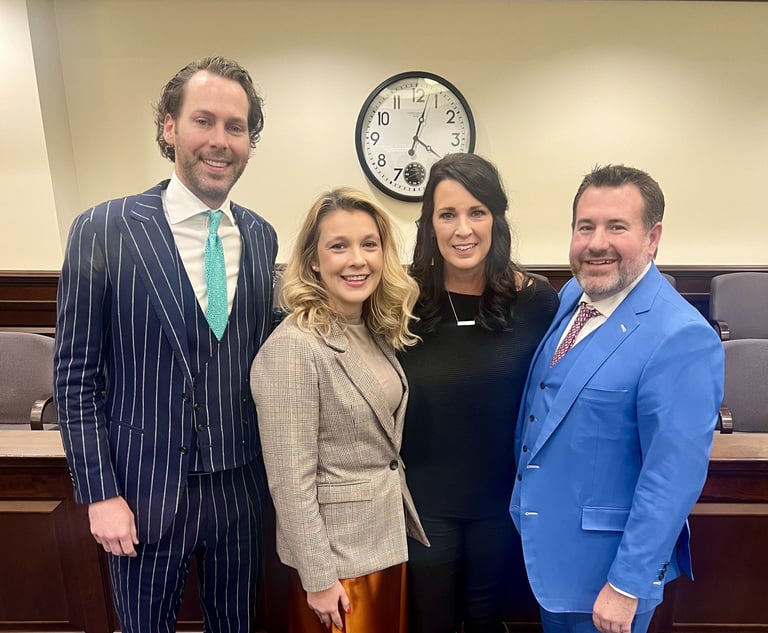 Photo credit: zibistanczyk/iStockphoto.com
Photo credit: zibistanczyk/iStockphoto.comJustices Say Superior Court Lacked Jurisdiction in Involuntary Commitment Case
The Pennsylvania Supreme Court has ruled that the Superior Court erred when it heard the appeal of a man whose gun ownership was curtailed because of an involuntary mental health hospitalization.
October 17, 2019 at 03:18 PM
4 minute read
The Pennsylvania Supreme Court has ruled that the Superior Court erred when it heard the appeal of a man whose gun ownership was curtailed because of an involuntary mental health hospitalization.
In an Oct. 15 opinion authored by Supreme Court Justice Debra Todd, the court reversed the Superior Court's ruling in favor of petitioner J.M.Y. in In re Petition of J.M.Y. Chief Justice Thomas Saylor filed a concurring opinion.
J.M.Y. brought the case claiming his due process rights had been violated when a trial court declined to expunge his mental health records because his commitment was not valid under the law. The Superior Court en banc ultimately reversed that decision 8-1.
Now, considering only whether the Superior Court had jurisdiction to hear the appeal, the tables were turned once more by the high court. Todd said the fact that J.M.Y. filed his appeal too late meant the Superior Court could not hear the case.
J.M.Y. "had 30 days from the date of the mental health review officer's certification to petition the court of common pleas for review of any due process or other challenges to the certification," Todd said. "As he did not do so, but instead filed the instant petition over two years later, neither the court of common pleas nor the Superior Court had jurisdiction to consider the merits of these claims. Accordingly, we must reverse the order of the Superior Court, which itself reversed the common pleas court's order dismissing appellee's petition."
In his one-page concurrence, Saylor agreed with the ruling but took issue with the majority's view of jurisdiction.
"Since subject matter jurisdiction connotes 'the competency of the court to determine controversies of the general class to which the case presented for consideration belongs' it is quite tenuous, in my view, to treat time deadlines as implicating a court's subject matter jurisdiction," Saylor said.
According to Superior Court Judge Jacqueline Shogan's majority opinion, J.M.Y. got drunk at a fraternity party at the University of Pittsburgh in 2012. He was on medication for depression and anxiety, and he was apprehended by the police after he attempted to harm himself, Shogan said.
The police took him to Western Psychiatric Hospital, where he was involuntarily committed under Section 302 of the Mental Health Procedures Act, according to Shogan. He was discharged after spending four days there. Sections 302, 303 and 304 prohibit the ownership or use of firearms, which is problematic given the plaintiffs' interest in law enforcement as an occupation. J.M.Y. sought to have the record of his commitment expunged.
During proceedings over the course of 2015, the trial court held that J.M.Y.'s commitment was valid under Sections 302 and 303. However, the Superior Court held that the certification of involuntary commitment was improper and that J.M.Y. was not made aware of the proceedings immediately following his commitment.
"Upon review of the certified record, we conclude that the certification was not proper and, therefore, the Section 303 commitment was not valid," Shogan said. "At the expungement hearing, appellant testified that, although he spoke with a public defender prior to his release from the hospital, he was unaware of any 303 commitment hearing held on September 25, 2012. Appellant testified that he merely 'was told that there could be a hearing.'"
She added, "As indicated by appellant in his appellate brief, our review of the certified record reflects that the trial court failed to address whether there was sufficient evidence to support appellant's Section 302 commitment. Rather than address the underlying Section 302 commitment, the trial court made a determination regarding the validity of appellant's Section 303 commitment."
Judge Judith Ference Olson penned a dissent, arguing that she did not believe the court had jurisdiction to review the commitment.
"Simply stated, no statute provides our courts with jurisdiction to review the sufficiency of appellant's Section 303 commitment or to expunge the record of such commitment—indeed, 42 Pa.C.S.A. Section 5571(b) forbids our exercise of jurisdiction," Olson said.
Terry Despoy of Despoy and Robertson in Hollidaysburg represents J.M.Y. and did not return a call seeking comment. The Pennsylvania State Police declined to comment.
This content has been archived. It is available through our partners, LexisNexis® and Bloomberg Law.
To view this content, please continue to their sites.
Not a Lexis Subscriber?
Subscribe Now
Not a Bloomberg Law Subscriber?
Subscribe Now
NOT FOR REPRINT
© 2024 ALM Global, LLC, All Rights Reserved. Request academic re-use from www.copyright.com. All other uses, submit a request to [email protected]. For more information visit Asset & Logo Licensing.
You Might Like
View All
Federal Judge Rejects Firm's Counterclaims Against Former Legal Secretary, Citing Lack of Jurisdiction
6 minute read


'Stake Out My Space': Attorneys, Law Professors Flock from X to Bluesky
Trending Stories
Who Got The Work
Michael G. Bongiorno, Andrew Scott Dulberg and Elizabeth E. Driscoll from Wilmer Cutler Pickering Hale and Dorr have stepped in to represent Symbotic Inc., an A.I.-enabled technology platform that focuses on increasing supply chain efficiency, and other defendants in a pending shareholder derivative lawsuit. The case, filed Oct. 2 in Massachusetts District Court by the Brown Law Firm on behalf of Stephen Austen, accuses certain officers and directors of misleading investors in regard to Symbotic's potential for margin growth by failing to disclose that the company was not equipped to timely deploy its systems or manage expenses through project delays. The case, assigned to U.S. District Judge Nathaniel M. Gorton, is 1:24-cv-12522, Austen v. Cohen et al.
Who Got The Work
Edmund Polubinski and Marie Killmond of Davis Polk & Wardwell have entered appearances for data platform software development company MongoDB and other defendants in a pending shareholder derivative lawsuit. The action, filed Oct. 7 in New York Southern District Court by the Brown Law Firm, accuses the company's directors and/or officers of falsely expressing confidence in the company’s restructuring of its sales incentive plan and downplaying the severity of decreases in its upfront commitments. The case is 1:24-cv-07594, Roy v. Ittycheria et al.
Who Got The Work
Amy O. Bruchs and Kurt F. Ellison of Michael Best & Friedrich have entered appearances for Epic Systems Corp. in a pending employment discrimination lawsuit. The suit was filed Sept. 7 in Wisconsin Western District Court by Levine Eisberner LLC and Siri & Glimstad on behalf of a project manager who claims that he was wrongfully terminated after applying for a religious exemption to the defendant's COVID-19 vaccine mandate. The case, assigned to U.S. Magistrate Judge Anita Marie Boor, is 3:24-cv-00630, Secker, Nathan v. Epic Systems Corporation.
Who Got The Work
David X. Sullivan, Thomas J. Finn and Gregory A. Hall from McCarter & English have entered appearances for Sunrun Installation Services in a pending civil rights lawsuit. The complaint was filed Sept. 4 in Connecticut District Court by attorney Robert M. Berke on behalf of former employee George Edward Steins, who was arrested and charged with employing an unregistered home improvement salesperson. The complaint alleges that had Sunrun informed the Connecticut Department of Consumer Protection that the plaintiff's employment had ended in 2017 and that he no longer held Sunrun's home improvement contractor license, he would not have been hit with charges, which were dismissed in May 2024. The case, assigned to U.S. District Judge Jeffrey A. Meyer, is 3:24-cv-01423, Steins v. Sunrun, Inc. et al.
Who Got The Work
Greenberg Traurig shareholder Joshua L. Raskin has entered an appearance for boohoo.com UK Ltd. in a pending patent infringement lawsuit. The suit, filed Sept. 3 in Texas Eastern District Court by Rozier Hardt McDonough on behalf of Alto Dynamics, asserts five patents related to an online shopping platform. The case, assigned to U.S. District Judge Rodney Gilstrap, is 2:24-cv-00719, Alto Dynamics, LLC v. boohoo.com UK Limited.
Featured Firms
Law Offices of Gary Martin Hays & Associates, P.C.
(470) 294-1674
Law Offices of Mark E. Salomone
(857) 444-6468
Smith & Hassler
(713) 739-1250





